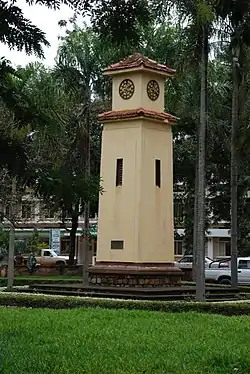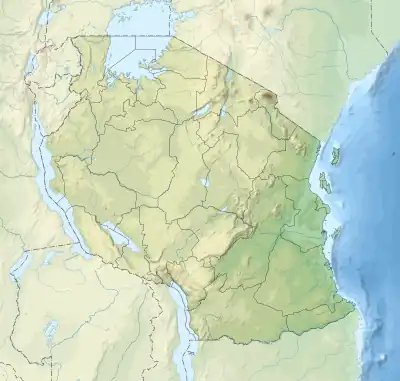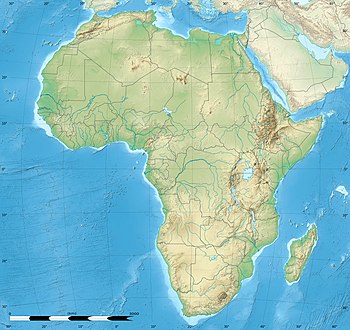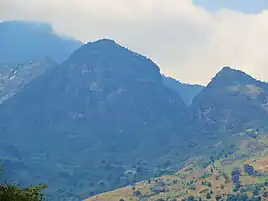Morogoro | |
|---|---|
| Mji kasoro bahari | |
 Morogoro clock tower | |
 Morogoro Location of Morogoro  Morogoro Morogoro (Africa) | |
| Coordinates: 06°49′27″S 37°39′48″E / 6.82417°S 37.66333°E | |
| Country | Tanzania |
| Region | Morogoro Region |
| District | Morogoro District |
| Area | |
| • Total | 360 km2 (140 sq mi) |
| • Land | 260 km2 (100 sq mi) |
| • Water | 100 km2 (40 sq mi) |
| Highest elevation | 509 m (1,669 ft) |
| Population (2022 census)[2] | |
| • Total | 471,409 |
| • Density | 1,300/km2 (3,400/sq mi) |
| Time zone | GMT +3 |
| Climate | Aw |
| Website | www |
Morogoro is a city located in the eastern part of Tanzania, approximately 196 kilometers (122 miles) west of Dar es Salaam.[3] It serves as the capital of the Morogoro Region. Informally, it is referred to as Mji kasoro bahari, which translates to city short of an ocean/port.[4]
In Morogoro the non-profit organization APOPO trains Gambian pouched rats known as HeroRATS, for landmine detection as well as the detection of tuberculosis. Notably, the Sokoine University of Agriculture is based in Morogoro. The city is also home to various missions that provide educational and medical facilities, benefiting the local community.
Mindu Dam
The Mindu Dam on the Ngerengere River serves as the primary source of water in Morogoro, supplying approximately 80% of the city's water needs. However, the dam project, initiated in 1978, has been the subject of controversy. The formation of a lake behind the dam has resulted in high rates of bilharzia infection,[5] and the city's water supply has been polluted by mercury runoff from nearby gold mining activities.[6] Deforestation in the surrounding areas has also contributed to the rapid siltation of the dam.[7]
To address these issues, a program funded by USAID/MCC with a budget of $8.31 million was implemented in 2012–13. The program aimed to rehabilitate drinking water resources from the Uluguru Mountains by establishing an inlet and treatment plant near the Regional Governance offices at the upper end of Boma Road, benefiting the Morogoro Water Supply Authority (MORUWASA).
Geography, agriculture, and climate
The city is situated at the foothills of the Uluguru Mountains and serves as a significant agricultural center in the region.
Morogoro is the site of many Sisal plantations.[8] (Pictured below)
The climate in Morogoro is warm and tropical with average highs ranging from 32°C (90.7°F) to 27.8°C (82.6°F), and lows ranging from 16.7°C (62.1°F) to 12.4°C (54.3°F).
| Climate data for Morogoro (1991–2020) | |||||||||||||
|---|---|---|---|---|---|---|---|---|---|---|---|---|---|
| Month | Jan | Feb | Mar | Apr | May | Jun | Jul | Aug | Sep | Oct | Nov | Dec | Year |
| Mean daily maximum °C (°F) | 32.2 (90.0) |
32.6 (90.7) |
31.8 (89.2) |
29.8 (85.6) |
28.7 (83.7) |
28.1 (82.6) |
27.8 (82.0) |
28.7 (83.7) |
30.3 (86.5) |
31.7 (89.1) |
32.3 (90.1) |
32.6 (90.7) |
30.6 (87.1) |
| Mean daily minimum °C (°F) | 16.7 (62.1) |
16.2 (61.2) |
15.9 (60.6) |
15.7 (60.3) |
14.6 (58.3) |
13.0 (55.4) |
12.4 (54.3) |
12.6 (54.7) |
13.5 (56.3) |
15.0 (59.0) |
16.2 (61.2) |
16.6 (61.9) |
14.9 (58.8) |
| Average rainfall mm (inches) | 100.4 (3.95) |
78.0 (3.07) |
141.8 (5.58) |
203.8 (8.02) |
74.5 (2.93) |
15.3 (0.60) |
10.0 (0.39) |
8.2 (0.32) |
7.1 (0.28) |
39.5 (1.56) |
52.7 (2.07) |
91.2 (3.59) |
822.5 (32.38) |
| Average rainy days (≥ 1.0 mm) | 6.5 | 5.8 | 11.9 | 18.0 | 10.8 | 2.9 | 2.1 | 2.0 | 1.5 | 4.3 | 5.8 | 7.2 | 78.8 |
| Source: NOAA[9] | |||||||||||||
Education
Morogoro is home to several notable universities and colleges, including Sokoine University of Agriculture (SUA), Muslim University of Morogoro, St. Joseph University College, and Jordan University College. Mzumbe University is located approximately 26 kilometers south of the town along the Iringa Highway. The municipality also houses renowned institutions such as Ardhi Institute Morogoro, Morogoro Teachers College, and LITI (Livestock Training Institute).
Among the secondary schools in the area is Kilakala Girls High School, which is one of the oldest secondary schools in the country (previously known as Marian College). Morogoro Secondary School (formerly Aga Khan Secondary School), Forest Hill Secondary, Jabal Hira Muslim Secondary, Kigurunyembe Secondary, Lutheran Junior Seminary, St. Francis de Sales Seminary, Kimamba Secondary, Sua Secondary, Ifakara Secondary, St. Peter's Seminary, Lupanga Practising Secondary School (a recently established school near Kigurunyembe Teacher's College), and Kola Hill Secondary School are also located within the municipality. Additionally, the Morogoro International School, an English-language institution, was founded in 1975.[10]
Transport
Transportation options within the town of Morogoro include public transport buses known as dala dala, which provide services for commuting within the area. The fares for these buses are typically around Tsh. 500 to 700 for travel from the town to nearby locations. For faster transportation within town areas, motorcycles known as boda boda and Bajaj vehicles are commonly used. The fares for these modes of transportation vary depending on the distance to the destination.
Sports and culture
In the Tanzanian Premier League, the football club Mtibwa Sugar F.C. represents the city of Morogoro.
Morogoro is notable for being the hometown of Salim Abdullah, the founder of the Cuban Marimba Band, as well as the Morogoro Jazz Band, which was established in 1944.[11] During the period from the mid-1960s to the 1970s, Morogoro was the residence of Mbaraka Mwinshehe, a highly influential and celebrated musician in Tanzania known for his skills as a lead guitarist and singer-songwriter.[11] The Amani Center, located in Morogoro, provides assistance to over 3,400 disabled individuals in the surrounding villages.[12]
Sister cities
The city of Milwaukee, in the state of Wisconsin, United States, has a sister city relationship with Morogoro, as designated by Sister Cities International.[13] Additionally, Morogoro is twinned with Linköping in Sweden and Vaasa in Finland.[14]
Fuel tanker explosion
On 10 August 2019, a fuel tanker exploded in the town, resulting in the deaths of 100 people and causing injuries to at least 47 others. The event was one of the largest disasters of its kind to occur in Tanzania.[15][16]
Gallery
 The Uluguru Mountains in the background of Morogoro city
The Uluguru Mountains in the background of Morogoro city Waterfalls in Morogoro
Waterfalls in Morogoro Sisal plantations in the outskirts of Morogoro (Uluguru Mountains in the background)
Sisal plantations in the outskirts of Morogoro (Uluguru Mountains in the background) Aerial view
Aerial view The Jamhuri Stadium
The Jamhuri Stadium
References
- ↑ ""Statistical Abstract 2011", Tanzania National Bureau of Statistics, page 3". Archived from the original on November 5, 2013.
- ↑ Citypopulation.de Population of the major cities in Tanzania
- ↑ "Weatherbase: Historical Weather for Morogoro, Tanzania". Weatherbase. 2011. Retrieved on November 24, 2011.
- ↑ "Amani Home". city short of an ocean.
- ↑ IRDC Archive: The Essential Health Interventions Project Archived 2007-05-04 at the Wayback Machine
- ↑ "Mindu destruction setting stage for a catastrophe". Archived from the original on January 16, 2005.
- ↑ Smith, Celina; Schaafsma, Marije; Platts, Philip; Mwakalila, Shadrack; White, Sue; Ashagre, Biniam (June 22, 2014). "Water for Everyone". The Arc Journal. hdl:1826/9342 – via dspace.lib.cranfield.ac.uk.
- ↑ "Highland Estate". www.estates.co.tz. Retrieved 2023-10-19.
- ↑ "Morogoro Climate Normals 1991–2020". World Meteorological Organization Climatological Standard Normals (1991–2020). National Oceanic and Atmospheric Administration. Archived from the original on 16 September 2023. Retrieved 16 September 2023.
- ↑ "School History | Morogoro International School".
- 1 2 Askew, Kelly Michelle (2002). Performing the nation: Swahili music and cultural politics in Tanzania. University Of Chicago Press. p. 92. ISBN 978-0-226-02981-8.
- ↑ "Amani Home". Amani Centre Morogoro.
- ↑ "Milwaukee's Sister Cities". city.milwaukee.gov.
- ↑ "Vaasa twin Cities". britannica.com.
- ↑ "Death toll of Morogoro fuel tanker fire hits 100". The Citizen (Tanzania). Dar es Salaam, Tanzania: The Citizen (Tanzania). 21 August 2019. Retrieved 29 June 2022.
- ↑ "Toll from Tanzania truck blast reaches 100". NTV Uganda. Kampala, Uganda: NTV Uganda. 21 August 2019. Retrieved 29 June 2022.
External links
![]() Media related to Morogoro at Wikimedia Commons
Media related to Morogoro at Wikimedia Commons
